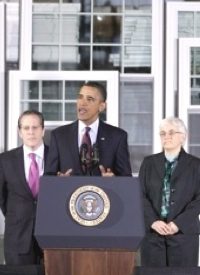
Though it is touted to reveal budget cuts, President Obama’s multi-trillion-dollar budget-to be submitted to Congress on February 14-will fittingly reveal a love affair between the federal government and spending. The budget will also likely set up a conflict between fiscal conservatives and congressional spenders that will take Congress to the 2012 elections.
According to the President, he is ready to trim programs that are fiscally irresponsible, including community action grants to local governments.
During Tuesdays State of the Union Address, President Obama proposed a five-year freeze on domestic spending, amounting to approximately $400 billion in savings over a decade. Of course, Obamas promise was also contradicted by his announcements to extend access to 80 percent of Americans to high-speed rail with 25 years.
Nevertheless, fiscal conservatives assert that the five-year freeze proposal is a weak one and does not put enough of a dent in federal spending, particularly as the Congressional Budget Office indicates that that the U.S. budget deficit will reach a record $1.5 trillion this year.
Bloomberg News reports, Obama’s freeze wouldn’t apply to defense, Medicare, Medicaid, Social Security, and interest in the national debt. As a result, the freeze would apply to 18 percent, or $663 billion, in the current 2011 fiscal year.
Still, Obama favors the modest proposal. We want to cut with a scalpel as opposed to a chain saw. Frankly, were just going to have to trim some of these programs.
On December 21, the United States Congress compromised and approved a continuing resolution that will fund the federal government through March 4. Democrats had hoped to force through a trillion dollar budget that would have funded the government through the end of the fiscal year, September 30, but fierce Republican opposition forced the compromise.
Senate Minority Leader Mitch McConnell asserts that both parties need to work together to reduce the federal deficit.
We have two opportunities, both the continuing resolution and the debt ceiling, to try to accomplish something on a bipartisan basis on both our short-term debt and our long-term unfunded liability. The president ought to step up to the plate with us and tackle it together.
Obama’s budget is also expected to provide details for proposals made during the State of the Union address, including road and bridge repairs, and the creation of an infrastructure bank to help finance the repairs.
Bloomberg News adds:
He would add 100,000 teachers of science, engineering and mathematics within 10 years; make permanent a $10,000 tuition tax credit; replace educations No Child Left Behind Law; increase research and development spending; provide high-speed wireless access to 98 percent of Americans in five years; abolish tax breaks for oil, gas and coal producers; and put 1 million advanced-technology vehicles on roads by 2015.
That certainly does not sound like a President anxious to make spending cuts. It clearly indicates that the President is not heeding the warnings of CBO’s Director Doug Elmendorf, who told Obamas deficit commission that action must be taken immediately to shrink the size of the deficit before the United States reaches a tipping point similar to that of Greece and Ireland.
To prevent debt from becoming unsupportable, the Congress will have to substantially restrain the growth of spending, raise revenues significantly above their historical share of GDP or pursue some combination of those approaches, said Elmendorf.
According to the Washington Examiner, however, Congress has failed to show real interest in addressing the deficit:
Congress has been unwilling to commit to a plan to cut spending or raising taxes. Obama’s 18-member, bipartisan debt commission this summer issued a report calling for $200 billion in spending cuts, increasing the gas tax and raising the retirement age to 69 by 2075. But the panel didn’t have the votes to pass the plan, so its recommendations wont be sent to Congress. Even if the debt panel had agreed on the plan, there is no law to force the House or Senate to vote on the recommendations.
Though Obamas Fiscal Commission recommended spending cuts at triple the rate the new revenue is raised, Obama’s State of the Union signaled the opposite.
And no financial reform has been proposed where it truly counts, in unsustainable entitlement programs like Social Security and Medicaid.
Photo: President Barack Obama announces Gene Sperling, left, as the new director of the National Economic Council, while speaking about the economy at Thompson Creek Manufacturing, Jan. 7, 2011, in Landover, Md. At right is Katharine G. Abraham, nominee for member, Council of Economic Advisers: AP Images




